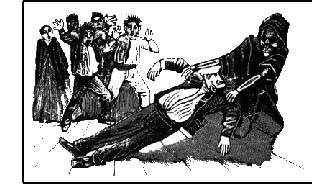

|

|

|

|
| |
|
|
|
Upside Down: A Primer for the Looking-Glass World Days and Nights of Love and War Some years ago, Uruguayan writer Eduardo Galeano argued that the effectiveness of writers on the left "depends on our capacity to be audacious and astute, clear and appealing." He added, "I would hope that we can create a language more fearless and beautiful than that used by conformist writers to greet the twilight." If one wants an illustration of the truth of this claim, and an example of its achievement, you need only read Galeano's two most recent books, the new and brilliant Upside Down and the lyrical and moving Days and Nights of Love and War, just reissued in an updated edition by Monthly Review Press. In Upside Down, the subject under scrutiny is the world capitalist order (or as he
"Never have so many economic resources and so much scientific and technological knowledge been brought to bear on the production of death," he charges. "The countries that sell the world the most weapons are the same ones in charge of world peace. Fortunately for them, the threat of world peace is receding. The war market is on the rebound and the outlook for profits from butchery is promising. The weapons factories are as busy as those producing enemies to fit their needs." Designed as a counter-textbook, with boxed sidebars, playful asides, summary paragraphs, aphorisms, prose poems, lesson plans ("Racism and Sexism 101") and points for discussion, Galeano digs into the contradictions of a world order that "enjoins everyone to consume" while it "prevents the vast majority of humanity from doing so." Though dense with facts and historical details, the writing in Upside Down is so compelling that even familiar statistics that risk becoming abstractions-- 1.6 billion people are worse off now than they were 15 years ago; one Mexican billionaire is a rich as 17 million Mexicans; of every 10 poor people, seven are women--ring with proper indignation. With Brechtian simplicity, Galeano (translated by Mark Fried) jars the reader, both visually and intellectually, though at times the placement of sidebars interrupts the flow of the text and makes one wish they had found a way of waiting for a paragraph break, or at least the end of the sentence, before your eye is pulled to the promise of a new narrative. Following Brecht's observation that famines don't just happen under capitalism, but are organized, he notes that poverty, torture and fear are consequences of the deliberate plans of those running the upside-down world: "The system of power that creates poverty is the same one that wages war without quarter on the desperate people it begets. ... Jails and bullets are the proper therapy for the poor." If one senses a dark and bitter sense of humor here, as well as fury and condemnation, it's because Galeano insists on humanizing and personalizing his analysis.
|


